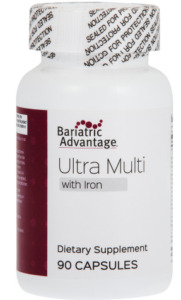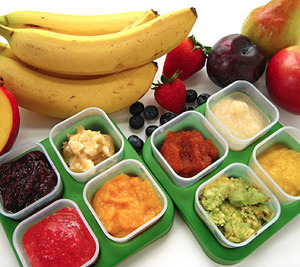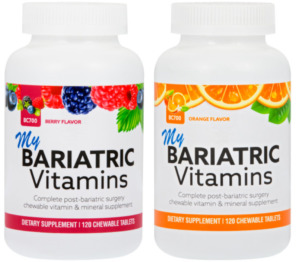A Post-Bariatric Surgery Diet for Success

A Post-Bariatric Surgery Diet for Success
Weight loss surgery is an excellent tool to help you lose weight. To help ensure success, though, you must also follow the post-bariatric surgery diet given to you by your surgeon and/or dietitian. This diet will go through stages, from clear liquids shortly after your surgery to full liquids, and then from soft foods to more solid ones. Typically, it takes about 9-12 weeks to gradually progress to eating solid foods again. “Here’s a tip that really helps,” says dietitian Lori Rosenthal, who specializes in weight loss and bariatric issues. “If you don’t own a food, then you can’t eat it. So, if there are trigger foods that you struggle to control, get them out of the house.
There is enough temptation in life, overall, so you need your house to be safe. If people in your family want to keep the food in the home, let them know how crucial it is to your health that you keep it out. Family members can still eat the food – just not at home.” She also adds suggestions for when cravings hit. “This surgery is a major life event,” she acknowledges, “so you’ll need alternative coping methods when you are stressed or otherwise feeling negative emotions. That might be walking or listening to music or writing in a journal.” Ideally, you will have started to incorporate healthy eating habits before your surgery, such as eating more protein and eating smaller meals.

Bariatric Advantage Ultra Multivitamin with Iron
Bariatric Vitamins and Minerals
You’ll also need to take supplements to provide vitamins, minerals and nutrients – include protein – that you can no longer naturally absorb in your stomach and intestine. Plus, you’ll likely need liquid protein supplements for at least the first few months, post-surgery, and perhaps much longer, even for a lifetime. That’s because of the challenges presented by the minimum protein requirements for patients:
- Women need a minimum of 50 to 60 grams per day
- Men need a minimum of 60 to 70 grams per day
Supplements are typically portion-controlled and can include:
Post bariatric surgery diet guidelines will vary by surgeon and you must strictly comply with your surgeon's or dietician's diet guidelines.
Get a bariatric nutritionist's tips on long-term nutritional planning for vitamins & mineral needs in our previous post.
Gastric Bypass, Post-Bariatric Surgery Diet: The First Three Months
After gastric bypass surgery, your newly created stomach pouch, which is about the size of a walnut, is healing. It is absolutely essential to follow specific bariatric eating guidelines that will ensure that you properly heal, while obtaining adequate nutrition. In most cases, you'll will need to follow a very specific gastric bypass or bariatric diet for approximately three months. Once the pouch has healed, portion sizes must remain small with reduced caloric intake to continue your weight loss. Your gastic bypass diet, which your surgeon or dietitian will create for you, typically involves a four-phase plan. You will advance gradually through the phases, depending on your tolerance. Keep in mind, every person is different and will progress through the phases of the post-surgery bariatric diet at a different rate:
Clear Liquid Diet

For the first couple of weeks, post-surgery, your most important goal is to keep well hydrated. Your aim should be to drink 64 ounces of fluids per day. Immediately after gastric bypass surgery, you will need to sip only clear (see through) liquids such as:
- Diluted apple juice
- Diluted grape juice
- Diluted cranberry juice
- Clear beef broth
- Clear chicken broth
- Clear vegetable broth
- Protein fruit drinks
- Sugar-free gelatin
Avoid using a straw and continue to sip slowly throughout the day. In a 30-minute period, you should drink 1 to 2 ounces.

Full Liquid Diet
Within a week of bariatric surgery, you can add full liquids (ones you cannot see through) to your diet such as:
- Low fat cream bariatric soups (broth only)
- Skim milk
- Protein shakes and smoothies
- Yogurt
- Diet puddings
- Liquid protein supplements
Pureed Diet (Soft Foods or "Mushies")
Pureed foods are foods with a consistency of applesauce without pieces or chunks. Rather than simply chopping up food into small bites, incorporate high protein pureed foods into your diet. To puree, place food into a blender or food processor and add liquid (skim milk, broth or low-calorie gravy). Puree until smooth. When your surgeon allows, begin taking a chewable vitamin supplement with minerals.
Continue to drink plenty of fluid, but do NOT eat and drink at the same time. Typical recommendation: stop drinking fluids approximately 20 to 30 minutes before you plan to eat, then wait another 20 to 30 minutes before drinking fluids again. To give time for your stomach pouch / opening to heal, pureed foods are usually eaten for three to four weeks.
Soft Foods to Regular Diet

You will probably begin adding soft foods with more texture in them by about five or six weeks after your bariatric surgery. “Soft” means tender / easy to chew and can include:
- ground or finely diced meats
- canned or soft fruit
- cooked vegetables
- rice, macaroni or noodles
During this diet transition phase, you will eat many small meals a day – perhaps six, transitioning down to four – and sip water as directed in between. Meals should include protein rich foods, such as:
- lean meat
- yogurt
- eggs
You will usually eat soft foods for about eight weeks before progressing to regular texture foods, as recommended by your surgeon of dietitian. After three months, you'll typically progress to eating regular foods with three small meals and three healthy snacks daily. Lean sources of protein are crucial in each meal, along with fruits, vegetables and whole grains. Your surgeon or dietician will usually prescribe a reduced calorie diet (1000-1200 calories per day) to continue your weight loss. Continue to limit your intake of high-sugar, high fat foods that are loaded with calories, but devoid of nutrients. You'll also need continue to take vitamin and mineral supplements for life, to compensate for the nutrients that you're no longer able to absorb through the bypassed parts of your stomach and intestine.
Long Term Bariatric Surgery Diet Tips
- Remember that protein is the most important nutrient in your post-surgery diet. So, eat lean protein-rich foods first. That way, if you feel full after eating your protein, you can stop eating, knowing that you’ve met the most crucial dietary requirement. Ask your surgeon how much daily protein you will need; it will probably be between 60 and 100 grams daily.
- Eat small meals. You will need to eat three to six small meals per day, with each meal no more than six to eight ounces in size. This equals about 1 to 1 ½ cups of food at a time. When hungry between meals, eat a healthy protein snack (no more than two to three times daily). Do not exceed the amount of food recommended by your surgeon and/or dietician, and stop eating before you feel full.
- Eat and drink slowly. Each meal should take you at least 20 to 30 minutes, with at least 15 to 20 chews per bite, and it should take 30 to 60 minutes to drink one cup of fluid. A slow passage of well-chewed food is vital, as it needs to pass through a small stomach pouch and narrowed opening to the intestine. This helps to ensure that nothing gets stuck, and helps to avoid dumping and/or vomiting.
- Drink fluids in between meals, not with meals. Fluid intake with meals can cause food to exit your stomach pouch too quickly. Once empty again, you can feel hungry. Plus, you may experience pain, plus nausea and vomiting – along with dumping syndrome.
- Eat fruits and vegetables.
- Keep hydrated. Choose non-carbonated beverages, as the gas in carbonation can stretch your stomach or the opening. Most surgeons recommend at least six to eight cups of water daily. Other options can include decaffeinated coffee and/or tea, broth, and/or diluted fruit juices. You can also use artificial sweeteners such as those found in Crystal Light.
- Take daily vitamin and mineral supplements as prescribed by your surgeon and/or dietician.

After you ask your surgeon and/or dietician about your specific needs, take a look at the bariatric vitamins and minerals available at Bariatric Choice plus the protein supplements and products we offer.
You should consult with a healthcare professional before starting any diet, exercise or supplementation program, before taking any medication, or if you have or suspect you might have a health problem.